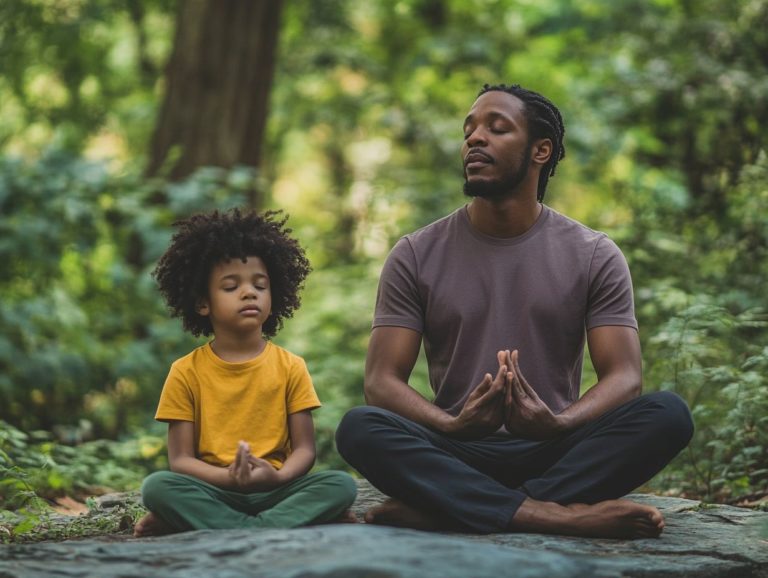10 Daily Mindfulness Practices for Parents
Contents
- Mindfulness Practices for Busy Parents
- Key Takeaways:
- 1. Start the Day with Intention
- 2. Practice Gratitude
- 3. Take Breaks Throughout the Day
- 4. Listen to Your Child with Full Attention
- 5. Engage in Mindful Activities with Your Child
- 6. Take Deep Breaths When Feeling Overwhelmed
- 7. Practice Self-Compassion
- 8. Let Go of Perfectionism
- 9. Set Boundaries and Prioritize Self-Care
- 10. End the Day with Reflection and Gratitude
- What is Mindfulness and How Can It Benefit Parents?
- How Can Mindfulness Help with Parenting Challenges?
- What Are Some Simple Mindfulness Practices for Busy Parents?
- How Can Parents Incorporate Mindfulness into Daily Routines?
- What Are the Benefits of Practicing Mindfulness as a Family?
- How Can Parents Encourage Mindfulness in Their Children?
- Frequently Asked Questions
- What are 10 daily mindfulness practices for parents?
- How can practicing mindfulness benefit parents?
- How can I find time for daily mindfulness practices as a busy parent?
- Can children benefit from practicing mindfulness with their parents?
- Do I need any special equipment or training to practice mindfulness as a parent?
- Key Takeaways
- Frequently Asked Questions
Mindfulness Practices for Busy Parents
Parenting can often feel like an endless whirlwind, leaving you little time for self-reflection, self-care routines, or moments of tranquility amidst the daily hustle.
By incorporating mindfulness into your routine, you can transform your experience as a parent, fostering patience, presence, and a deeper connection with your child. This ultimately enhances your happiness and emotional regulation.
Get ready to explore ten simple yet powerful mindfulness practices tailored specifically for busy parents. From starting your day with intention to concluding it with gratitude, these strategies will not only enhance your well-being but also nurture a more mindful family environment, improving your mental health and positive thinking.
Explore with us the various ways you can infuse mindfulness into your parenting journey.
Key Takeaways:

- Starting the day with intention can set a positive tone for the rest of the day as a parent, helping to reduce stress and cultivate mindfulness.
- Practicing gratitude can help parents cultivate a mindset of appreciation, contentment, and emotional awareness.
- Taking breaks throughout the day can help parents recharge, manage stress, and be more present for their child.
1. Start the Day with Intention
Incorporate present-focused practices in your morning routine. Starting your day with intention is a helpful habit that can profoundly elevate your mindfulness. It allows you to center your thoughts on the present moment, setting a positive tone that reverberates throughout your daily life.
By consciously cultivating mindfulness, you align your mental state with your goals and aspirations. This can significantly reduce stress and enhance your emotional regulation as the day unfolds.
Embracing this daily ritual creates a flow of good feelings, equipping you with the tools to navigate challenges more effectively. Incorporating mindfulness techniques such as deep breathing exercises (taking slow and deep breaths) and body check-ins (noticing how your body feels) can deepen this intentional practice, grounding you before you dive into the day s responsibilities.
Mindfulness and meditation experts like Thich Nhat Hanh emphasize the importance of being grounded in the present moment. By integrating these principles into your morning routine, you cultivate a profound sense of peace and clarity, enhancing your overall well-being.
2. Practice Gratitude
Practicing gratitude is an enriching mindfulness activity that deepens your emotional awareness and nurtures positive thinking, ultimately enhancing your overall well-being.
By weaving gratitude practices into your daily life, you can shift your mindset from one of scarcity and negativity to one filled with abundance and positivity. Simple actions, like journaling about three things you re thankful for each day, serve as powerful reminders of the good that exists even amid challenges.
Mindfulness meditation further supports this journey by encouraging you to reflect on the blessings of the present moment, no matter how small they may seem. Engaging in such exercises not only lifts your mood but also fosters a resilient outlook, enabling you to appreciate your relationships and the experiences that shape your journey.
This ultimately contributes to your happiness and well-being.
3. Take Breaks Throughout the Day
Taking regular breaks throughout your day is essential for maintaining mindfulness. These moments allow you to manage stress and engage in anxiety-reduction techniques that can significantly benefit your mental health.
Incorporating simple body check-ins and breathing exercises during these intervals can greatly enhance your focus and overall well-being. By dedicating just a few minutes to notice your physical sensations and take deep breaths, you can ground yourself and release any tension that might have accumulated while you work.
This brief pause rejuvenates your mind and fosters a clearer perspective on your tasks, ultimately boosting your productivity. These mindful moments offer a valuable opportunity for reflection and realignment of your priorities, transforming your approach to daily challenges with renewed energy and purpose.
Start today and see the difference mindfulness can make in your parenting journey!
4. Listen to Your Child with Full Attention
Practicing active listening with your child is an essential aspect of mindfulness in parenting. It helps manage feelings and deepens your connection with both yourself and your child.
In a world filled with distractions, being fully present during conversations is even more vital. This intentional engagement creates a bridge between you and your child, fostering deeper understanding and empathy.
By incorporating mindfulness techniques like focused breathing and maintaining eye contact, you can elevate your listening skills. This ensures your child feels valued and heard.
When you take the time to understand your child’s emotions, you cultivate a nurturing environment where feelings are acknowledged. This paves the way for open communication and trust.
These practices can turn everyday interactions into meaningful exchanges that encourage emotional growth, resilience, and sensory awareness.
5. Engage in Mindful Activities with Your Child
Engaging in mindful activities with your child not only imparts valuable mindfulness practices but also nurtures sensory awareness, gratitude, and emotional regulation within your family dynamic.
These experiences enrich your relationship with your child while equipping them with essential tools for emotional regulation.
For instance, when you practice mindful eating together, you encourage your child to savor the taste, texture, and aroma of their food. This fosters a deeper connection to what they consume.
Similarly, nature walks allow them to fully immerse themselves in the sights and sounds of the environment. This provides a serene moment of reflection and calm amidst the daily hustle and bustle.
By incorporating these practices, you cultivate emotional resilience and encourage a greater sense of mindfulness in the present moment.
6. Take Deep Breaths When Feeling Overwhelmed

Ever feel overwhelmed? Deep breathing can help! When you re feeling overwhelmed, practicing deep breathing exercises is a powerful mindfulness technique to reduce stress and cultivate a sense of calm.
By focusing on your breath, you can redirect your attention away from racing thoughts and any physical tension. Techniques like diaphragmatic breathing, a technique that helps you breathe deeply using your diaphragm instead of shallowly with your chest, encourage your diaphragm to fully engage. This enhances oxygen exchange and promotes relaxation of your nervous system.
Another effective method is box breathing, where you inhale for four counts, hold for four, and exhale for four. This rhythmic pattern sends a clear signal to your body to relax, promoting heart coherence and calming the nervous system.
Integrating these practices into your daily routine whether during work breaks or right before bed can greatly alleviate feelings of anxiety. This gives you a sense of control and grounding amid life s chaos.
7. Practice Self-Compassion
Start your journey of self-compassion today and transform your life! Practicing self-compassion is an essential mindfulness approach that elevates your emotional well-being. It enables you to cultivate positive thinking and resilience when faced with challenges, breaking the stress cycle and enhancing leadership skills.
By embracing self-kindness, you can develop a deeper awareness of your thoughts and feelings. This allows you to navigate difficult situations with grace.
This transformative journey begins with simple practices, such as daily affirmations, where you acknowledge your worth and learn to extend the same kindness to yourself that you would readily offer a friend.
Incorporating mindfulness exercises, like meditation or mindful breathing, creates a sanctuary for self-reflection. This fosters an environment where self-criticism can be gracefully replaced with nurturing thoughts.
As you weave these practices into the fabric of your daily life, remember that consistency is vital. Small, intentional steps can lead to profound shifts in your mindset over time.
8. Let Go of Perfectionism
Letting go of perfectionism is a pivotal aspect of mindfulness that can significantly enhance your emotional regulation and deepen your connection to yourself.
In a world where success is often equated with flawlessness, the weight of perfectionism can lead to chronic stress, anxiety, and a pervasive sense of inadequacy. Chasing unattainable standards erodes self-esteem. It also creates a cycle of comparison, making it hard to appreciate your unique qualities.
By embracing mindfulness practices, you can learn to accept imperfections and cultivate a sense of self-love. Techniques like meditation, deep breathing, and journaling can support your journey, encouraging a compassionate attitude towards yourself. These practices promote a healthier, more balanced perspective on life while breaking negative feedback loops.
9. Set Boundaries and Prioritize Self-Care
Setting boundaries and prioritizing self-care is crucial for maintaining mindfulness, particularly in a world increasingly overwhelmed by technology addiction and information overload. Mindfulness tips and self-care routines can help reduce these issues.
To cultivate a more balanced lifestyle, consider scheduling regular breaks throughout your day to disconnect from screens and immerse yourself in activities that promote relaxation and rejuvenation. Simple practices like mindful breathing exercises, gentle stretches, or even short walks in nature can have a remarkable impact on reducing stress levels.
Creating a designated space for your self-care rituals whether it s a cozy reading nook or a serene meditation corner reinforces the importance of dedicating time to yourself and practicing mindfulness. Integrating a gratitude journal into your daily routine supports a positive mindset and reduces stress, allowing you to reflect on your experiences and celebrate those small victories that often go unnoticed.
10. End the Day with Reflection and Gratitude
Ending your day with reflection and gratitude elevates your mindfulness, nurtures positive thinking, and improves your mental health. This practice allows you to cultivate a serene sense of peace before drifting off to sleep.
By taking just a few moments each night to review your day, you not only acknowledge the highlights but also gain valuable insight into your emotional landscape (your feelings and how they change over time) and mental state. This practice empowers you to spot patterns in your feelings quickly, transforming your emotional awareness!
One effective way to weave gratitude into your bedtime routine is by keeping a gratitude journal. Before you settle in for the night, take a moment to jot down three things you re grateful for that day these can be as simple as enjoying a warm cup of tea or witnessing the smile of a loved one.
Incorporating deep breathing while you reflect on these positive moments can enhance your relaxation, paving the way for restorative sleep and a more fulfilled mindset. These mindfulness techniques can help break negative feedback loops and bring about a sense of calm.
What is Mindfulness and How Can It Benefit Parents?
Mindfulness is the art of being fully present and engaged in the moment, bringing a wealth of benefits for you as a parent. By embracing mindfulness, you can enhance your emotional regulation and boost your overall happiness in daily life.
Grounded in ancient Buddhist teachings, mindfulness encourages you to cultivate awareness of your thoughts and feelings without judgment. This skill can be particularly enabling as you navigate the complexities of parenting. When faced with the unique challenges of managing stress and maintaining patience amidst the delightful chaos of family life, adopting a mindful approach can transform your household into a more harmonious space.
Research has demonstrated that practicing mindfulness allows you to respond more calmly to your children’s needs and significantly improves your overall mental well-being and emotional regulation. This nurturing environment fosters open communication and strengthens emotional connections, ultimately benefiting your entire family unit.
How Can Mindfulness Help with Parenting Challenges?

Mindfulness can be a powerful ally for you as a parent, helping you handle the challenges of parenting with grace. It enhances your emotional regulation and equips you with effective stress management techniques.
Many parents find it challenging to balance work, household duties, and the emotional needs of their children. This struggle often leads to overwhelming stress and anxiety, which can cloud your judgment and affect your interactions with your kids.
By weaving mindfulness practices into your daily routine, you can cultivate an awareness and presence that allow you to respond to challenges more thoughtfully. Simple techniques, like deep breathing exercises or a brief meditation session, can enable you to reclaim a sense of calm in the chaos, fostering a nurturing environment for both yourself and your children.
What Are Some Simple Mindfulness Practices for Busy Parents?
For busy parents, weaving simple mindfulness practices into daily routines can be a game-changer for nurturing self-care routines and enhancing overall well-being.
Taking just a few moments for yourself can make a remarkable difference. You can start by engaging in short breathing exercises. A few deep breaths can ground you beautifully before you dive into the next task.
Embracing mindful eating during your meals cultivates a deeper appreciation for food and allows you to savor every bite without distractions like technology or social media. Even pausing to appreciate nature during a walk can offer a refreshing mental break.
Ultimately, these small yet powerful practices create a sense of calm and clarity amidst the chaos of your busy schedule, helping to manage anxiety and reduce stress. Start today, and see how just a few minutes of mindfulness can change your day!
How Can Parents Incorporate Mindfulness into Daily Routines?
Incorporating mindfulness into your daily routine allows you to cultivate emotional well-being and promote a sense of presence and connection within your family life.
By intentionally setting aside time each morning and evening for mindfulness practices, you can enrich your interactions and foster a calming atmosphere at home. For instance, consider a simple morning exercise like reflecting on gratitude over breakfast, where each family member shares one thing they are thankful for.
As the day comes to a close, winding down with a brief mindfulness meditation or body check-in can help everyone transition from the hustle and bustle to a restful night. During this time, you might focus on your breath or engage in a guided visualization. These practices not only enhance your personal well-being but also strengthen family bonds through shared experiences that prioritize emotional awareness and compassion.
What Are the Benefits of Practicing Mindfulness as a Family?
Practicing mindfulness as a family offers a wealth of benefits, such as improved emotional regulation, heightened happiness, and deeper connections among family members. Engaging in family meditation sessions cultivates positivity and emotional awareness.
By engaging in collective mindfulness activities, you can create a nurturing environment where everyone feels valued and heard. Simple practices allow each member to center their thoughts, focus your thoughts, and share their feelings in a safe space, fostering empathy and understanding.
Taking mindfulness walks in nature encourages family members to connect with one another while remaining present in their surroundings. Incorporating gratitude exercises at the dinner table enriches the positive dynamics within your family, giving everyone the opportunity to express appreciation for one another.
Together, these activities enhance individual well-being and create a supportive atmosphere where love and connection can truly thrive.
In conclusion, practicing mindfulness as a family not only benefits your personal growth but also strengthens the bonds that hold your family together. Embrace these practices today, and watch how they transform your family life!
How Can Parents Encourage Mindfulness in Their Children?
Are you ready to help your children thrive with mindfulness? You play a vital role in encouraging mindfulness in your children by modeling techniques that promote awareness. Additionally, creating a nurturing environment for emotional growth is essential. Utilizing resources from experts like Deepak Chopra and Eckhart Tolle can enhance your approach.
To enhance this journey, consider incorporating a variety of engaging mindfulness activities that capture your children s attention and help them stay focused on the present. Such practices can include sensory awareness games, active listening, and heart coherence exercises.
Simple breathing exercises, mindful walks in nature, or even practicing gratitude together can further enhance their emotional regulation. This helps them recognize and appreciate the positive aspects of their lives, cultivating a resilient mindset. These practices can be particularly beneficial in mitigating the effects of anxiety and depression.
By seamlessly weaving mindfulness practices into daily routines and highlighting their significance, you enable your children to navigate their emotions effectively and develop invaluable lifelong skills. Influences from mindfulness leaders like Thich Nhat Hanh and Shauna Shapiro can provide additional guidance, as well as utilizing 5 apps to help parents practice mindfulness.
Frequently Asked Questions
Understanding the importance of mindfulness can lead to a more fulfilling parenting experience. Here are some common questions parents have:
What are 10 daily mindfulness practices for parents?

- Start your day with a mindful breathing exercise for 5 minutes.
- Take a moment to appreciate your surroundings and express gratitude.
- Engage in mindful eating by paying attention to each bite and savoring the flavors.
- Set aside 10 minutes for a mindful walk or exercise outdoors.
- Practice mindful communication by actively listening to your child without judgment.
- Take a break from technology and practice being present in the moment.
- Incorporate a daily gratitude journal to reflect on positive experiences.
- Practice self-compassion and offer kindness to yourself during challenging parenting moments.
- Create mindful rituals, such as a bedtime routine, to help you and your child wind down.
- End your day with a brief body scan to relax and release tension.
How can practicing mindfulness benefit parents?
Practicing mindfulness can benefit parents in many ways, including enhancing attention span and leadership skills. It helps reduce stress and anxiety, improve focus and attention, increase self-awareness and compassion, and strengthen relationships with children and partners. Moreover, mindfulness allows parents to feel more present and enjoy the little moments with their children.
How can I find time for daily mindfulness practices as a busy parent?
Finding time for daily mindfulness practices may seem challenging, but it is possible. Awareness exercises can be integrated seamlessly into your routine. Start by prioritizing a few minutes each day for yourself. This could mean waking up a few minutes earlier or taking short breaks throughout the day. Remember, even a few minutes of mindfulness can make a significant difference in your overall well-being.
Can children benefit from practicing mindfulness with their parents?
Absolutely! Children can benefit greatly from practicing mindfulness with their parents. Mindfulness for children enhances their emotional well-being and helps them deal with chronic pain and other stress-related issues. It also aids in developing emotional regulation skills, improving their focus and attention, and strengthening their bond with their parents. Practicing mindfulness together can be a fun and engaging way for families to spend quality time together.
Do I need any special equipment or training to practice mindfulness as a parent?
No, you do not need any special equipment or training to practice mindfulness as a parent. All you need is a willingness to be present in the moment and a commitment to incorporating mindfulness into your daily life. There are many resources available, such as books, apps, and online courses, that can guide your practice if you wish to learn more about mindfulness techniques and practices.
Key Takeaways
Mindfulness can transform your parenting journey by:
- Enhancing emotional regulation for both you and your children.
- Improving relationships within the family.
- Providing tools to manage stress and anxiety.
- Creating moments of connection and presence with your children.
Start your mindfulness journey today, and reap the benefits for you and your children!
Why Mindfulness Matters for Parents
Parenting can be hectic and overwhelming. Practicing mindfulness helps parents cope with daily challenges, reduce stress, and manage anxiety.
Mindfulness allows parents to be present and aware of their children’s needs. It enhances well-being and creates a more positive, peaceful home environment.
Practicing mindfulness and emotional regulation helps parents become their best selves for their children. Start your mindfulness journey today for a happier, healthier family life!






